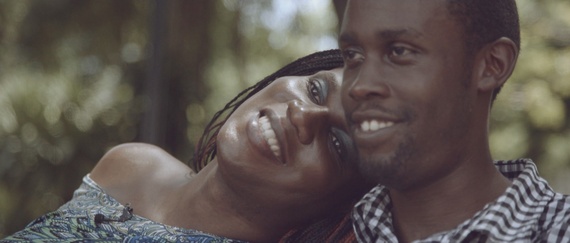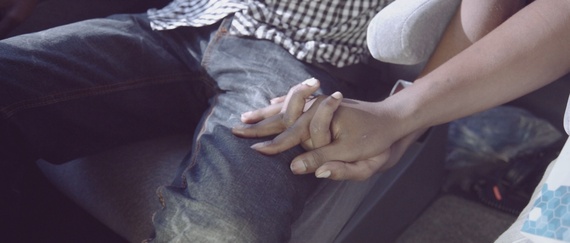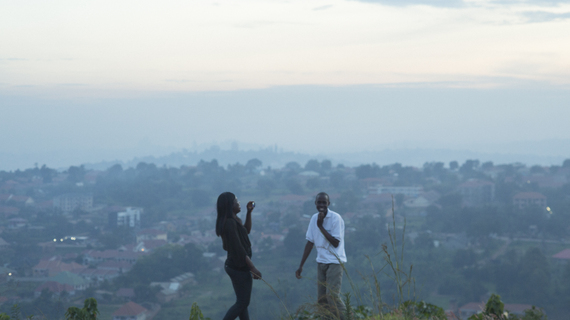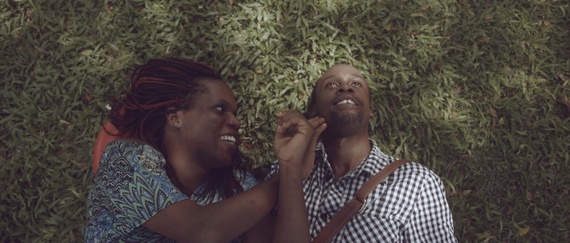"I've loved him since I was in high school." These were the exact words of Cleopatra Kambugu when describing the affection she felt for Nelson, the love of her life. Being transgender or being associated with a transgender person in Uganda are dangerous things. The two, however, held on to their relationship despite the odds.
In Uganda, gay and transgender people face the sharpest claws of bigotry. There, 96 percent of the people are against homosexuality and gender non-conformity, effectively putting the LGBTQI minority in danger. This according to Pew Global Attitudes Survey in 2013, a research done among 99 countries. Even though many Ugandan's claim they're not discriminating against LGBTQI people, reality says something different. I really do love Uganda, but I think it's so incredibly stupid that many Ugandans doesn't accept everyone's equal human rights. Claiming to be good Christians, but then judging people who doesn't conform to their societal norms.
That hate is a funny thing. One second Ugandan's blame the West for bringing homosexuality to Uganda, the next, it's embracing the hatred that Western (mainly U.S.), missionaries have brought with them. This to me is the definition of religious propaganda from the West. A propaganda that does nothing but harm the lives of innocent Ugandan citizens. Of course, to many Ugandans, they're not seen as innocent. They sleep well at night, telling themselves that gay people should be put to death because it says so in the old testament, Leviticus 20:13.
If a man has sexual relations with a man as one does with a woman, both of them have done what is detestable. They are to be put to death; their blood will be on their own heads. (Leviticus 20:13)
First of all, Leviticus was written suited for Israel's circumstances at that time. The harsh punishments it wants to invoke, are based upon a theocratic Israel at the time. When the government head was God, when people lived by the Law (the Torah, the first five books of the bible). At this time, adultery was also seen as a capital offense. In our secular culture, it would be utterly hilarious to say that Christian men from Uganda aren't sleeping around outside their marriage. But that's a whole other topic...
This selectiveness of what to live by in the bible and what not to is what destroys our society. In this case, it leads to the discussion of LGBTQI people qualifying as humans in the first place. But in a civilized society, claiming that someone should be put to death is -- to me -- a sign of a society not working. It doesn't matter if you're the U.S. or Uganda. Death penalties are a result of people looking for a quick fix to something it doesn't want to deal with. This is not at all unique to Uganda. It's a global problem of humans seeing themselves as worth more than other minorities, countries or cultures.
I've talked with Cleo about love so many times. Not only about social and political pressure, but also about personal struggles, and how she met the love of her life. Cleo met Nelson during a time when she struggled with her identity and suffered from abuse. She was a friend to him. Cleo recalls Nelson as one of the few guys who was ever nice to her. This was in high school, and he was dating her best friend.
The first time she saw him, she knew she liked him. But she kept her affection a secret because she didn't want to do anything that would hurt her friend's relationship with him. Besides, she knew Nelson was straight, and thus wouldn't date a gay person.
Not too long after a few stolen glances, Cleo and Nelson finally started engaging in casual conversations. They started getting to know each other when he and her best friend were having issues. Although she wanted to help fix their relationship, she was unexpectedly caught up in her infatuation. At that time, it felt wrong, so she dismissed whatever feelings she had.
But sometimes fate has its own tricks. They met each other again when she and her friend visited him at the college where he took his medical course. The guy took both girls out for dinner, a dinner which Cleo recalls fondly.
The relationship between Nelson and Cleo's friend soured further. Eventually, they broke up. This breakup gave Nelson and Cleo's special bond a chance to flourish. From Cleo's perspective, it seemed as though the feeling was mutual. It seemed as though both knew they shared something special. But neither was willing to put a label on whatever feelings they shared, let alone make a commitment.
Nelson was reluctant to explore deeper. He thought Cleo was gay at first. Even Cleo thought she was gay at that time. With a societal pressure, this misidentification somewhat stopped their mutual affection in its tracks, but true love would always endure. Despite knowing he wasn't gay and he wouldn't fall in love with a gay man, Nelson knew he harboured strong feelings for her. And he couldn't deny it.
If we dig a little bit deeper into what the bible does say, there are two passages from the new testament that are important to understand why Leviticus is problematic.
Christ redeemed us from the curse of the Law by becoming a curse for us. (Galatians 3:13)
It is for freedom that Christ has set us free. Stand firm, then, and do not let yourselves be burdened again by a yoke of slavery. (Galatians 5:1)
In other words, Jesus died by the cross to rescue the people from the law. And if we go back to living by Leviticus, we then refuse to accept Christ's death on the cross. There's another interesting part in Galatians 3:28.
There is neither Jew nor Gentile, neither slave nor free, nor is there male and female, for you are all one in Christ Jesus. (Galatians 3:28)
It's very clear. Love other people.
So what is it that drive ordinary Ugandans to hate and become vicious animals who attack other human beings? Even though the bible they live by clearly says not to. Many blame the U.S missionaries, but I'm not so sure it's that simple. Ugandans are smart and loving human beings, so for them to hate someone this much is not only about religion.
I think it has much more to do with the male-dominated society in Uganda. To me, who grew up playing football in a small town in Sweden, we had exactly the same kind of male group dynamics that resulted in bullying anyone who showed weakness. I think that in a male-dominated society, the pressure of being a masculine man is even greater. This makes men feel insecure and frightened, sometimes of their own sexuality. I have a hard time seeing anything changing to the better in Uganda before the male role changes. Hopefully, more women working and changing the power structures will help. Until then, many men will continue having a weird relationship to their sexuality and they will continue to bully other people as a way of positioning themselves in society.
Somehow, many men consider themselves to be of more value as human beings, but with that way of thinking, you're simply not fit for 2015. Christian or not, it would do the human race some good if you re-evaluated your view on human rights. Judging anyone who identifies as LGBTQI is not any different than the oppression that black people have faced throughout history because of skin color. All of us are human beings. Nobody should even have to argue that, it's just stupid.
They say love is a funny thing, but it's even more hilarious when people claim the right to judge other people's right to love. What good has ever come of this hatred of others? Most of the time it leads to war and misery. In the case of LGBTQI people, it leads to discrimination and at times, death. This is because of many people's obsession with sex. Why would you be so interested in what other people are doing in their bedroom? Perhaps you should focus more on your own performance. Then focus on how you show affection towards your loved ones. It doesn't gain you anything to hate and discriminate against another human being. That behavior, if anything, would be something to judge. Regardless of sexuality, race or gender. To me it's just plain ignorance and arrogance that makes people do that.
For Cleo, time went by and eventually she found her true gender identity. She then went through a one-year transition. By the time she and Nelson met again, she had started to identify as a woman.
Cleo recalls how thrilled she was by her reunion with the most special man for her. She was hanging out with her girlfriends at a bar and saw a familiar face just across the table. She stared at him long enough until he stared back, and then they recognized each other through the curious glances they exchanged. During this chance meeting, she told him she had transitioned. At this time, she was perceived as any other woman. It was a sweet moment.
Since then, they began talking over the phone. They also started hanging out together, and it was during one of those dates they had when Nelson finally confessed his love for her. This confession went deep. Nelson admitted he liked her even before she transitioned and explained why he didn't do anything about his feelings back then. Cleo reminisces this moment and says, smiling, "It felt so good."
What made this relationship special was it was their first. Cleo was the first trans woman Nelson dated, and he was her first serious boyfriend. Things are new to both of them. Even so, Cleo knows she has found the man she doesn't want to lose. Nelson gives her strength. When she is around him, she can do anything. When they are together, nothing else matters.
Of course, it's hard to imagine any relationship without issues. One of the biggest hurdles in their relationship is the hostility towards LGBTQI people in their country. But they found support in Cleo's mom, who, in spite of her misgivings and cynicism, chose to let her daughter just be happy in love.
When I first started filming Cleo's life in the documentary The Pearl of Africa, she hadn't started dating Nelson. It was before this meeting in the bar. It's been amazing to see their relationship grow on camera. Not only as a couple, but also as human beings. Today Nelson has a deep understanding of what it means to be trans, this two years after I started filming them.
Cleo and Nelson's relationship endured despite the risks in an extremely conservative society. Like most couples, they have issues, which only make their relationship stronger. She fell in love with him for several reasons. But the most important reason was because, as she puts it, he saw her before she could even see herself. Moreover, she says he is one of the rare guys in Uganda who would dare to date a trans woman despite the repercussions. On top of that, he really tries hard to get to know her family. Cleo tries to rationalise her affection, but eventually resigns to the fact that she really cannot fully understand why she loves him. She just does.
"He prefers me calling him my husband. Yeah, that's sweet," Cleo says. She says that Nelson calls her his wife, not his girlfriend. Nelson once told her that's where they were headed, that as soon as he could get the ring on her finger, he won't be leaving anything to chance.
While you're reading this, Cleopatra is away from Uganda. She left her home country after her name appeared on the front page of a Ugandan newspaper. Like many others, she fled for her safety, not knowing if and when she could see her family again. Stripped of her basic human rights because she claimed her gender identity. Many Ugandans consider her to be mentally ill, but despite this societal pressure, Cleo and Nelson's love has endured.




